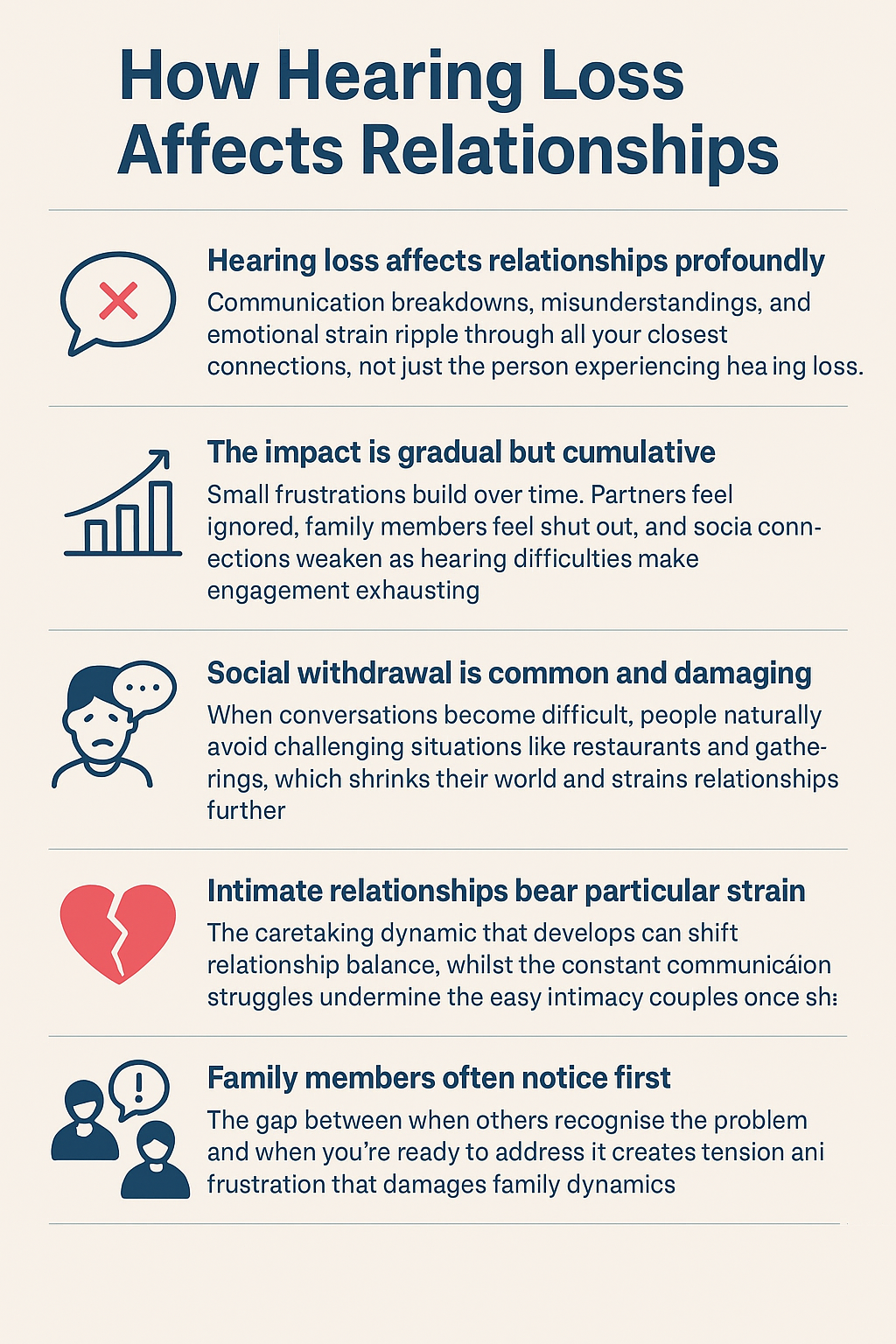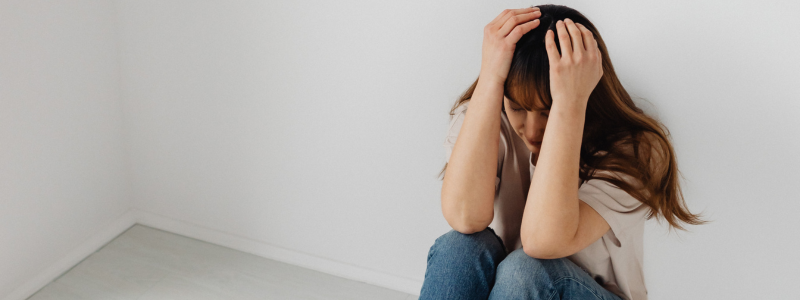
Head of Online Medical Content

Audiology Expert

How Hearing Loss Affects Your Relationships
(And what you can do about it)
Overview | Why your ears care about your heart | The research | What this means | Why this matters | Conclusion
Last Hearing Aid UK Update:
Overview
If you've noticed your partner asking "what?" more frequently, or if your family members have mentioned you seem distant at gatherings, hearing loss might be creating rifts in your relationships without anyone quite realising what's happening.
Hearing loss doesn't just affect the person experiencing it; it touches everyone in their life. Relationships that were once effortless can become frustrating, exhausting, and sometimes painfully distant.
Untreated hearing loss is one of the most underestimated relationship stressors, and it often goes unaddressed for years, whilst relationships quietly deteriorate.
This article goes through the communication barrier, the emotional toll, the social withdrawal and the strain of hearing loss and why it matters to address it.
The communication breakdown
Communication is the foundation of any relationship, and hearing loss undermines it in ways that aren't always obvious. You're not just missing words but missing context, tone, and the subtle emotional cues that make conversation meaningful.
Your partner might share something important about their day, but you've caught perhaps half of it. Rather than asking them to repeat everything, you might nod along and hope you've understood the gist. And the constant effort of trying to hear properly is genuinely draining.
The problem is that your partner notices, and they can tell when you're not fully engaged, when you're guessing at responses, when you've zoned out of the conversation because following it requires too much energy.
What starts as mild frustration can build into resentment over time, as misunderstandings become more frequent.
The emotional toll
There's an emotional weight to hearing loss that people don't discuss enough. For the person experiencing it, there's often embarrassment, frustration, and a growing sense of isolation.
You might feel like you're constantly apologising and constantly asking people to repeat themselves.
For partners and family members, there's a different emotional burden. They find themselves repeating things multiple times, raising their voices, and feeling ignored when you don't respond to something they've said.
They might interpret your hearing difficulties as a lack of interest or attention, especially if the hearing loss has developed gradually and hasn't been formally diagnosed.
Children can be particularly affected, as if a parent has hearing loss, family conversations become fragmented. They might stop trying to engage as much, which creates distance nobody intended.
Related reading: I'm constantly asking people to repeat themselves

Social withdrawal
People with untreated hearing loss gradually withdraw from social situations, as activities and gatherings become too difficult.
Restaurants become challenging because of background noise, and group conversations are nearly impossible to follow when multiple people are talking.
Social events that you once enjoyed now feel like you're working overtime just to keep up with what's being said. So, eventually, you start declining invitations and perhaps suggest staying in rather than going out. Your world becomes smaller, quieter, and unfortunately, lonelier.
Your relationships suffer because you're no longer participating in shared experiences, and your partner might go to social events alone, which creates its own set of complications.
Friends stop inviting you because you rarely attend, and the connections that sustained you begin to fray.
The strain on relationships
The impact on intimate relationships deserves particular attention because it's profound and often unspoken. When one partner has hearing loss, the other frequently becomes an interpreter.
This caretaking dynamic, however well-intentioned, can shift the balance of a relationship. The person with hearing loss might feel dependent or diminished, and the partner doing the interpreting might feel burdened, even if they'd never admitted to it.
When family members notice first
It's remarkably common for family members to notice hearing loss before the person experiencing it fully acknowledges it.
They're the ones watching you turn the television up to uncomfortable volumes, and they notice you're not responding when they speak to you from behind. They also see you struggling in conversations but not quite admitting there's a problem.
This creates tension because, from their perspective, there's a clear solution, which is getting your hearing tested and considering hearing aids. From your perspective, perhaps it doesn't seem that bad yet, or you're not ready to admit you need help.
The longer this gap persists between recognition and action, the more strain it places on relationships. Your family members might feel frustrated that you're not addressing something they see as obvious and treatable.
You, on the other hand, might feel nagged or pressured about something you're not ready to deal with.
Related reading: My family think I'm ignoring them, do I have hearing loss?
Why addressing it matters
Addressing hearing loss can genuinely transform relationships, and modern hearing aids are remarkably sophisticated, and the improvement in quality of life and quality of relationships can be substantial.
When you can hear properly again, conversations become easier, and you stop feeling exhausted from the constant effort of trying to understand.
Your partner stops feeling ignored or frustrated, and family gatherings become enjoyable rather than overwhelming.
We've seen this transformation countless times amongst patients and families. People come to us worn down by years of struggling, and their partners are often with them, equally worn down by the strain it's placed on their relationship.
After being properly fitted with appropriate hearing aids, the relief is noticeable, and it's not just about hearing better; it's about connection being restored.
Conclusion
Hearing loss doesn't exist in isolation; it affects every relationship you have, from your closest partnerships to casual friendships.
The communication difficulties, emotional strain, and social withdrawal that often accompany untreated hearing loss can damage even the strongest relationships over time.
The impact is gradual enough that you might not realise how much distance has crept in until you address the hearing loss itself. Partners become frustrated, family members feel shut out, and the person experiencing hearing loss often feels increasingly isolated.
Addressing hearing loss isn't just about hearing better; it's about maintaining and restoring the relationships that make life meaningful.
If your relationships have been strained by communication difficulties or if family members have suggested you might have hearing loss, getting your hearing tested is genuinely worth considering.
The sooner you address it, the less damage accumulates, and the easier it is to rebuild the connections that matter most.
Why Choose Us?
- FREE Hearing Tests
- Best Hearing Aids and Prices
- FREE Aftercare for Life
- FREE Home Visits
- 200+ Local Audiologists
- 60 Day Money Back Guarantee
Don't let hearing loss create distance in your relationships
If you've recognised your own situation in this article - the strained conversations, the frustration from loved ones, the exhausting effort of trying to keep up - it's worth getting your hearing tested.
Our audiologists offer free hearing tests either in a local clinic or in the comfort of your own home.
Most importantly, we understand that addressing hearing loss isn't just about hearing better but about reconnecting with the people who matter most to you.
Other hearing loss awareness articles you might like...
 Hearing aid stigma
Hearing aid stigma  The impact of diet on your hearing
The impact of diet on your hearing  How to tell if hearing loss is permanent or temporary
How to tell if hearing loss is permanent or temporary Watch Widex's video on hearing loss and relationships below
Our specialist service includes:
Do not spend hundreds of pounds without getting a second opinion from us.
Please call us on 0800 567 7621
 Not only are the prices great, but the service is fantastic! Many thanks to your team.
Not only are the prices great, but the service is fantastic! Many thanks to your team.What's included in our hearing aid prices?
Common FAQs about hearing aids and hearing loss
In general, any audiologist will always recommend to you the hearing aid model that best suits your needs. Here is a useful checklist to make sure that is the case.
- Audiologist's level of knowledge: The audiologist you have seen will hopefully have a wide knowledge of all available hearing aids; however, some will only be familiar with a small number of brands and, therefore, may not really be in a position to know which model is the best for you. It is OK to challenge their recommendation and ask them to justify why this particular brand is the one for you.
- Do research: Read about the hearing aid that was recommended. Does it seem like it will suit your lifestyle? Does it have more or fewer features than you need?
- Be aware of sales targets: Many high street retailers have specific tie-ins to a particular manufacturer/brand. The hearing aid they have suggested may still be the correct one for you, but do your research so that you know why they might have recommended it.
If you have significant hearing loss in both ears, you should be wearing two hearing aids. Here are the audiological reasons why:
Localisation: The brain decodes information from both ears and compares and contrasts them. By analysing the minuscule time delays as well as the difference in the loudness of each sound reaching the ears, the person is able to accurately locate a sound source.
Simply put, if you have better hearing on one side than the other, you can't accurately tell what direction sounds are coming from.
Less amplification is required: A phenomenon known as “binaural summation” means that the hearing aids can be set at a lower and more natural volume setting than if you wore only one hearing aid.
Head shadow effect: High frequencies, the part of your hearing that gives clarity and meaning to speech sounds, cannot bend around your head. Only low frequencies can. Therefore, if someone is talking on your unaided side, you are likely to hear that they are speaking, but be unable to tell what they have said.
Noise reduction: The brain has its own built-in noise reduction, which is only really effective when it is receiving information from both ears. If only one ear is aided, even with the best hearing aid in the world, it will be difficult for you to hear in background noise as your brain is trying to retain all of the sounds (including background noise) rather than filtering them out.
Sound quality: We are designed to hear in stereo. Only hearing from one side sounds a lot less natural to us.
Fancy some further reading on this topic? You can read about why two hearing aids are better than one in our article, hearing aids for Both Ears, here
For most people, the main benefit of a rechargeable hearing aid is simple convenience. We are used to plugging in our phones and other devices overnight for them to charge up. Here are some other pros and cons:
For anybody with poor dexterity or issues with their fingers, having a rechargeable aid makes a huge difference, as normal hearing aid batteries are quite small and some people find them fiddly to change.
One downside is that if you forget to charge your hearing aid, then it is a problem that can't be instantly fixed. For most, a 30-minute charge will get you at least two or three hours of hearing, but if you are the type of person who is likely to forget to plug them in regularly, then you're probably better off with standard batteries.
Rechargeable aids are also a little bit bigger and are only available in Behind-the-Ear models.
Finally, just like with a mobile phone, the amount of charge you get on day one is not going to be the same as you get a few years down the line. Be sure to ask what the policy is with the manufacturer's warranty when it comes to replacing the battery.
For most people, the answer is yes. But it's never that simple.
The majority of hearing problems affect the high frequencies a lot more than the low ones. Therefore, open fitting hearing aids sound a lot more natural and ones that block your ears up can make your own voice sound like you are talking with your head in a bucket. Therefore, in-ear aids tend to be less natural.
However, the true answer is we can't tell until we have had a look in your ears to assess the size of your ear canal, and until we have tested your hearing to see which frequencies are being affected.
People with wider ear canals tend to have more flexibility, also there are open fitting modular CIC hearing aids now that do not block your ears.
There is also the age-old rule to consider, that a hearing aid will not help you if it's sat in the drawer gathering dust. If the only hearing aid you would be happy wearing is one that people can't see, then that's what you should get.
Most people can adapt to any type of hearing aid, as long as they know what to expect. Have an honest conversation with your audiologist as to what your needs are.
Generally speaking, six or more. Unless it's none at all. The number of channels a hearing aid has is often a simplistic way an audiologist will use to explain why one hearing aid is better than another, but channels are complex, and it is really not that straightforward. Here are some reasons why:
Hearing aids amplify sounds of different frequencies by different amounts. Most people have lost more high frequencies than low, and therefore need more amplification in the high frequencies. The range of sounds you hear is split into frequency bands or channels, and the hearing aids are set to provide the right amount of hearing at each frequency level.
Less than six channels, and this cannot be done with much accuracy, so six is the magic number. However, a six-channel aid is typically very basic with few other features and is suitable only for hearing a single speaker in a quiet room. The number of channels is not what you should be looking at; it's more the rest of the technology that comes with them.
As a final note, different manufacturers have different approaches. One method is not necessarily better than any other. For example, some manufacturers have as many as 64 channels in their top aids. Most tend to have between 17 and 20. One manufacturer has no channels at all.
Manufacturer's warranties typically last between 2-5 years, depending on the brand and model, and cover defects in materials and workmanship. This includes repairs for component failures, electronic malfunctions, and manufacturing defects, but excludes damage from misuse, accidents, or normal wear. Most manufacturers also include loss and damage insurance for the first year.
We handle all warranty claims on your behalf, liaising with manufacturers and ensuring you get replacement devices quickly when needed. This comprehensive warranty coverage, combined with our lifetime aftercare, gives you complete peace of mind.
Our hearing tests are completely free, whether at our clinics or in your home. Unlike other providers who charge £30-£100 for home visits, we believe hearing healthcare should be accessible without financial barriers. Our comprehensive assessments include examination by a registered audiologist, audiogram results, and personalised recommendations.
All testing, future adjustments, and ongoing support are included at no extra cost. While NHS tests are also free, typical 6-week waiting periods often lead people to seek immediate private testing. We provide prompt, professional assessments that fit your schedule and budget.
Yes, we offer completely free home visits throughout the UK, and this service is included in our prices with no additional charges. Home visits are particularly valuable for people with mobility issues, busy schedules, or those who simply prefer the comfort and convenience of their own environment.
Our audiologists can conduct full hearing tests, fit hearing aids, and provide ongoing support in your home. This service sets us apart from many providers who either don't offer home visits or charge extra for them.
We can offer prices up to 40% lower than high street retailers because of our business model. As a network of 200+ independent audiologists, we don't have the massive overheads of large retail chains - no expensive high street premises, no sales targets pushing audiologists to sell the most expensive options, and no costly marketing campaigns.
However, we maintain the same buying power as the big chains because we purchase on behalf of our entire nationwide network. This means you get access to the same premium hearing aids with professional service, but at genuinely competitive prices.
We offer a comprehensive 60-day money-back guarantee, which gives you twice the industry standard time to properly assess whether your hearing aids are right for you. This extended period recognises that adjusting to hearing aids takes time, and your brain needs several weeks to adapt to the amplified sounds.
Unlike many providers who offer just 30 days, we believe 60 days gives you the confidence to test your hearing aids in all the situations that matter to you - from quiet conversations at home to busy restaurants and outdoor activities.
Other pages you might find useful
Ask the Experts
6 Morton Lane
Walkwood
Redditch
Worcestershire
B97 5QA
Latest Launch
When we refer to a product as 'Latest Launch', we mean it is the latest to be released on the market.
New
When we refer to a product as 'New', we mean that the product is the newest hearing aid model on the market.
When we refer to a product as 'Superseded', we mean that there is a newer range available which replaces and improves on this product.
Older Model
When we refer to a product as an 'Older Model', we mean that it is has been superseded by at least two more recent hearing aid ranges.
